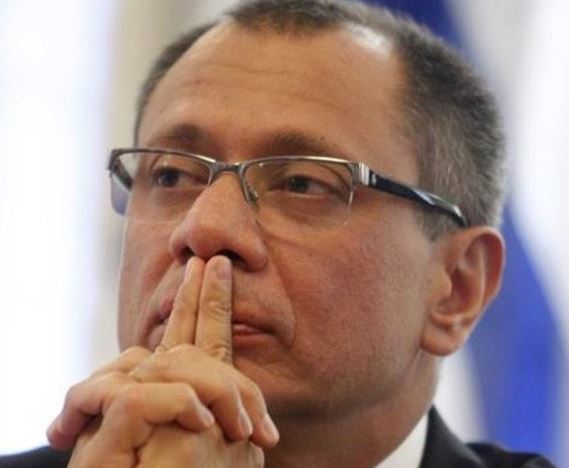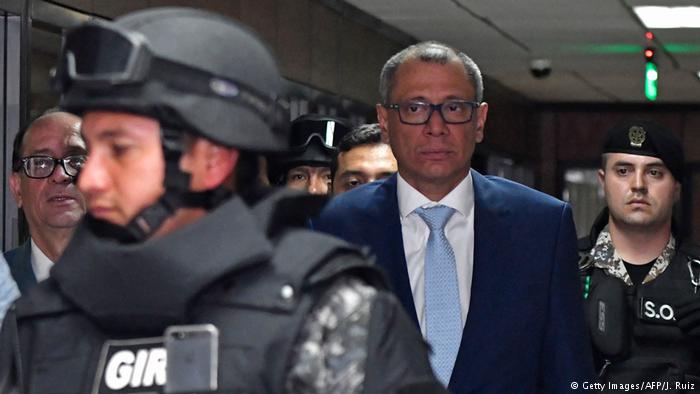To enforce removal of the corrupt vice-president from office, two thirds of the Ecuadorian legislators will need to vote in favor of impeachment.
By TZ Business News Staff and Agencies.
The highest court in the nation of Ecuador recently found the Vice President of that nation guilty of corruption.
As the general public contemplates introducing a law in this largely Christian nation that bans public officials from ever contesting for public office again if found guilty of corruption, the impeachment process to remove the rouge Ecuadorian public servant is in progress.
Open data from the Ecuadorian National Institute of Statistics and Census indicates 91.95% of the country’s population have a religion while 7.94% are atheists. The data indicates 80.44% of the population are Catholics while 11.30% are Protestant Christians; some 0.11% are agnostics.
The Constitutional Court of Ecuador (CCE) has endorsed commencement of impeachment proceedings against suspended Vice-President Jorge David Glas in a unanimous decision. Following a debate on the constitutionality of the proposal, the move was approved on Thursday [December 21, 2017] with eight votes in favor of starting a trial in the National Assembly against the corrupt Government official.
The court decision is due to be reported to the Council of the Legislative Administration (CAL), after which it must be forwarded to the Supervisory Commission, which is responsible for determining Glas’ status in the plenary session. To enforce the former vice-president’s impeachment two thirds of the legislators will ultimately need to vote in favor of impeachment according to South American media outlets.
 A court on Wednesday, December 13, 2017 sentenced Vice President Glas to six (6) years in prison on charges of illicit association, bribery and corruption stemming from a massive corruption scandal centred on Brazilian construction company Odebrecht; the Brazilian construction company bribed the official in return for handing it government contracts.
A court on Wednesday, December 13, 2017 sentenced Vice President Glas to six (6) years in prison on charges of illicit association, bribery and corruption stemming from a massive corruption scandal centred on Brazilian construction company Odebrecht; the Brazilian construction company bribed the official in return for handing it government contracts.
The Vice President was a close ally of former Ecuadorian President Rafael Correa, serving as his vice president from 2013 and retaining the position under the current president, Lenín Moreno, according to media reports.
The new President, Mr. Moreno–who has largely broken from Mr. Correa– suspended Mr. Glas in August, accusing him of not being a team player.
In October, a judge ordered that Mr. Glas be placed in pretrial detention as part of the investigation into Odebrecht. The public prosecutor’s office accused Mr. Glas, 48, of pocketing $13.5 million from Odebrecht through his uncle.
Judge Miguel Jurado of Ecuador’s top court accepted a request from prosecutors that Glas be detained to guard against any attempt to escape. Until Monday’s ruling Glas was free but barred from leaving the country. His lawyer denounced the decision as “unjust” and vowed to appeal. Mr. Glas’s downfall highlights how fallout from the Odebrecht scandal continues to ripple across South America.
The company, which has admitted to paying bribes to win contracts in a number of countries, has paid $3.5 billion in settlements in the United States, Brazil and Switzerland.
Odebrecht is accused of paying $33.5 million in bribes to secure contracts in Ecuador. The opposition says that Mr. Correa’s government was slow to investigate, an assertion he disputes.
Hours before, the former vice-president had approached the National Court of Justice to request that his sentence be conditionally suspended, the request was rejected by the court, which ruled that Glas does not meet the provisions of the Comprehensive Organic Criminal Code (COIP).
In order to grant a suspended sentence, according to the COIP, the penalty must not exceed five years.
Both Glas and his defense attorney, Eduardo Loor, have argued that the trial is about exacting political revenge and that the crimes he stands accused of have not been proven. Glas and his uncle Ricardo Rivera were two of nine people accused of criminal conduct in connection with the sprawling Latin American corruption case that has engulfed numerous public officials.

Demonstrators hold photos of Ecuador’s former President Rafael Correa and current Vice President Jorge Glas outside the Supreme Court in Quito, Ecuador, Monday, Oct. 2, 2017. Ecuador’s Supreme Court has ordered Glas held… (AP Photo/Dolores Ochoa)
Odebrecht has admitted paying US$788 million in bribes to officials in Panama, Colombia, Mexico, Brazil, Guatemala, Peru and the Dominican Republic.
Across Latin America, once seemingly untouchable politicians, including the former leaders of Brazil and Peru, have been charged or are under investigation for purportedly taking bribes or illegal campaign contributions from Odebrecht as part of the construction company’s rapid expansion across the region in the past decade.
Glas is highest-ranking official in Ecuador to be investigated and is suspected of leading a network of politicians and Correa officials who received $33 million that the construction company Odebrecht has acknowledged paying in exchange for contracts when he served as vice president from 2013 to 2017.
The case is partly built on testimony by former Odebrecht executives as well as former government officials. But Glas’ fall from grace has been compounded by the nation’s fast-shifting political landscape and a rupture in the ruling leftist coalition started by Correa.
Related Articles
Brazilian Businessman Gets Stiff Sentence in Petrobras Scandal
Ecuador’s Vice President Is Jailed in Bribery Investigation




